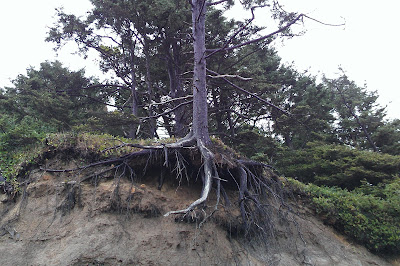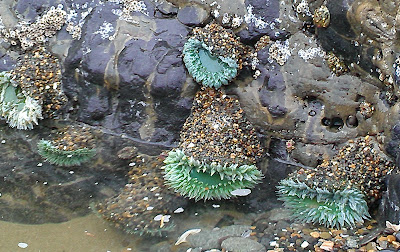Foreword
You’ve
probably heard about Google’s driverless car,
currently being tested on roadways around the land, and now we’re hearing about
Chrysler’s roll-out of a self-driving semi—imagine
seeing that in your rear-view mirror.
To be totally accurate, I guess these are not driverless vehicles. It’s just
that the actual “driver” is a robot of some sort, a computerized master
executive that gathers relevant data and directs the vehicle appropriately. Besides,
at this point, at least, there still needs to be a human “back-up” driver to
take over if things don’t go as planned. This new, no-longer-futuristic
technology crossed my mind as maybe a perfect analogy for my current quandary. Here's the story.
Chapter
1
The other day, I was having lunch with a friend, and we were talking about life
and aging and adventures and such—common topics for lunch with this long-time friend. As
she talked about her travels in recent months and her plans for a very active
summer, I had this “ah ha!” moment. I
hadn’t thought about it in advance and didn’t quite understand what it meant,
but I explained it to her like this: I feel like my life is in a bit of a rut.
Too much sameness. Every day is just every day. Even “events” fall into
predictable categories and sort of run together. I hadn’t especially noticed
this, although I had felt a bit cabin feverish over the winter. But now I had a
hint of what was behind this small sense of ill ease that had been floating
around my mind of late—not acutely troubling, just vaguely nagging. I said to
her, “I need something extraordinary in my life.” Not something monumental or
extreme. Just something extra-ordinary. Something that marks a moment, a day,
even a year as special, different.
So,
I’ve been reflecting on that comment for several days, trying to understand
what I meant and what I need to do. Slowly, but purposefully, I’m beginning to
craft some ideas about what I’d like my life to hold that would feel
extraordinary. Temporary adjustments, to be sure, but perhaps that’s the
point—keeping my life populated with temporary extraordinary moments. Some
ideas have come to mind and are slowly shaping themselves into plans. Among
them, I’m eager to write more—which means doing things other than gazing at the
sides of a rut, as ruts have little to offer as literary devices.
Chapter
2
Driving to the gym, I heard a short segment of a TED talk, part of a series on
the theme of “identities.” The speaker said something about how important it is
to be clear about your identity. That isn’t necessarily, she said, where you
live or what you do for your work. It’s more about what matters to you, what
you value and what principles you represent in your life. This is not a
startlingly novel proposal, but given my frame of mind, her words hit home. I realized
that I didn’t have a clear answer (even for myself) to her question as I heard
it: Who am I in the world? If I looked at myself from the outside, what values would
I see? What do I stand for? What message does my life convey to those around
me? How would I describe my place, my meaning in the world?
Of
course retirement plays a role in this. I’d venture to guess that this question
is familiar to many retired folks, since we often can’t call on the things that
used to define us—occupation, family role, position in an organization, etc. Still,
there have been times in my life, before and since retirement, when an answer
to that question was much clearer. But right now, it’s not. In that moment’s
thought, I realized that my life has become pretty self-absorbed. It strikes me
that events of the past several months may have nurtured this frame of
mind—some deaths in the family that have made my mortality all too evident, my
own struggles with health issues, changes in my habits (induced by routine,
laziness, boredom) that have kept me inside, at home—all may have contributed
to my sense of disconnection from the larger world.
So
now, it seemed, my “extraordinary” task looked three-fold—and, paradoxically,
more ordinary: to create extraordinary moments in the everyday, to be sure that
some of those are about something bigger than myself, and to write more about
it all.
Chapter
3
As it happens, just before my trip to the gym, my partner had mentioned an
article she just read about changing norms regarding disability language—i.e.,
how people with disabilities prefer to be named. It sounds fascinating and
important, a window on dramatic shifts in the world of disability and
disability rights. I expressed interest, which was totally genuine, but I
didn’t think much about doing anything more with it than reading it and
discussing it with her. She even suggested it as a blog topic, a proposal I set
aside. But after the “identity” comment, I thought about it again. The article
and what I might do with it now embodied just the sort of thing I’m looking for—something
out of the ordinary, something that meshes with the values I want to represent,
and something to trigger write-able thoughts.
Chapter
4
I came home from the gym to find a Smithsonian article about this self-driving
semi. Nice analogy, I thought: I’ve been taking a ride in a self-driven vehicle
that’s nicely programmed to follow the same routes, safely traversing the
streets of my life without much thought from me. Safe, maybe, but being safe is not
the same as being alive.
So
then I wondered: It this just another version of a recurrent theme in our lives?
Does everyone have these periods—you realize that you’ve gone on auto-pilot and
that it’s time to grab the wheel? I bet so … or at least lots of us. I know
I’ve been here before. On one occasion, I remember writing here about computer ruts, and on another, talking about making summers noteworthy—a different focus each time, but a similar point. And I expect I’ll be here again.
This time around, it just took a spontaneous comment to call my attention to my
own ruttedness, jerk my attention back to the road and, to stretch an analogy, the
many other roads I could be traveling. Once that happened, things started to
move, to shift. Now my job is to turn off the auto-pilot, stay alert, get busy
driving my life, and open my eyes to the possibilities for extraordinary
moments. Summer seems a perfect time to do that.
Afterword
Stay tuned:
there may be a self-driving vehicle commandeered by a genuine human traveling
the streets near you, headed for something extraordinary. We could make it a caravan,
if you’re so inclined.
© Janis
Bohan, 2010-2015. Use of this content is welcome with attribution and a link to
the post.













